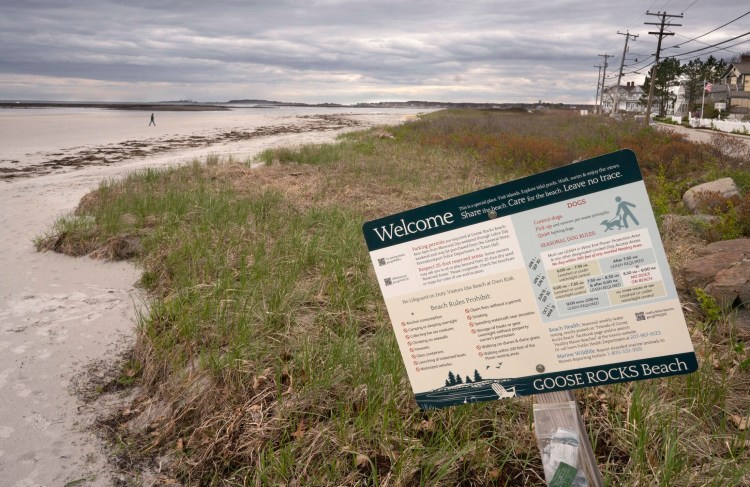AUGUSTA — The long legal battle over public access to Goose Rocks Beach in Kennebunkport is again in the hands of the state’s highest court.
The dispute between the town and beachfront property owners has been in the courts for nearly a decade, and the Maine Supreme Judicial Court already has issued two rulings in the case. Five justices heard oral arguments in the latest appeal Wednesday morning at the Capital Judicial Center in Augusta.
In Maine, waterfront property owners own all the way to the low tide mark. But state law allows the public to engage in acts of fishing, fowling and navigation in the intertidal zone, or the sand between the high and low tide lines. Called the public trust doctrine, that rule dates to 1647, and its meaning has long been disputed in the courts.
But Chief Justice Leigh Saufley began oral arguments by saying that public trust doctrine is not the focus of the case. The question at hand, she said, is who actually owns the beach and therefore can control other types of activities on its sands.
“We are talking about whether your clients have title to any or all of the beach, whether that is wet or dry sand,” Saufley told Benjamin Leoni, one of the attorneys arguing on behalf of the plaintiff property owners.
A York County Superior Court judge found last year that the town owns the beach, but the oceanfront property owners argued that he erred in interpreting certain ancient deeds and other historical records. The arguments and questions Wednesday looked back centuries to the original conveyances in that area of town.
“Drafted when most of the population was not even literate, colonial land grants are absolutely dripping with ambiguity and generalizations,” Leoni said. “To apply strict rather than liberal rules to these foundational ancient conveyances would cause title chaos across the state. That’s exactly what the trial court did here.”

The town said that argument is misplaced. Attorney David Kallin told the justices that the language in those original conveyances always meant that the beach itself was not included. He asked the court to keep the status quo, saying it would not cause the chaos the property owners’ attorney suggested.
“For as long as there has been private ownership, there has been joint use,” Kallin said.
This case began in the fall of 2009, when more than two dozen oceanfront property owners sued the town. Their complaint stated people were increasingly using Goose Rocks Beach for bonfires, picnics and boat storage. They have said since then that they do not want to close the beach to the public, but they want the right to regulate activities on the beach, such as asking people who are drinking or playing loud music to stop.
In 2012, a Superior Court judge ruled in favor of the town, saying the adjacent homeowners did not have exclusive rights to the beach. The ruling affirmed the public’s right to swim, walk and recreate on Goose Rocks Beach.
In 2014, the Maine Supreme Judicial Court overturned that ruling to side with the property owners. Later that year, however, the justices made the rare decision to reconsider the case and changed their opinion. The new ruling allowed Kennebunkport to argue its case again in Superior Court on a parcel-by-parcel basis, rather than argue for property access for the entire two-mile stretch of beach. The justices also clarified that their opinion was specific only to Goose Rocks Beach and did not impact beach access rights elsewhere in the state.
Last year, the lower court again found in favor of the town. The judge granted Kennebunkport title rights to the beach areas down to the low-tide mark in front of all but one of 23 beachfront properties. That decision is the one currently on appeal.
Five of seven justices heard the oral arguments Wednesday. Justices Ellen Gorman and Jeffrey Hjelm recused themselves and were not present. They are not required to state the reason for their recusal.
The court did not give a timetable for when it will deliver its opinion.
Send questions/comments to the editors.




Success. Please wait for the page to reload. If the page does not reload within 5 seconds, please refresh the page.
Enter your email and password to access comments.
Hi, to comment on stories you must . This profile is in addition to your subscription and website login.
Already have a commenting profile? .
Invalid username/password.
Please check your email to confirm and complete your registration.
Only subscribers are eligible to post comments. Please subscribe or login first for digital access. Here’s why.
Use the form below to reset your password. When you've submitted your account email, we will send an email with a reset code.